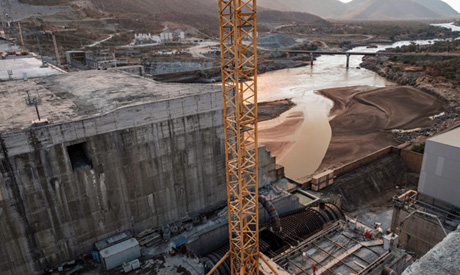
File Photo: A general view of the Blue Nile river as it passes through the Grand Ethiopian Renaissance Dam (GERD), near Guba in Ethiopia, on December 26, 2019 (Photo: AFP)
Sudanese capital of Khartoum is set to host a meeting attended the legal and technical committees from Egypt, Sudan and Ethiopia later this week to provide a draft agreement on Ethiopia's Grand Renaissance Dam's (GERD) filling and operation, nearly a week after the three countries agreed to finalize an agreement on the disputed dam later this month.
The meetings, scheduled for next Wednesday and Thursday, aim to formulate a draft agreement on the giant hydropower dam, a statement by the Sudanese irrigation ministry said.
Washington's meeting sought to assess the outcome of the dam talks over the previous two months, the ministry added.
The negotiators reached consensus on many issues, but they remain at odds over the dam filling and operation rules during periods of drought, the ministry noted.
Last week, Ministers from Egypt, Sudan and Ethiopia agreed to reconvene on 28-29 January in Washington to finalise an agreement on the filling and operation of GERD.
Following three days of talks in Washington mediated by the Treasury and the World Bank last week, the ministers agreed that the filling of the $4 billion dam will be undertaken in stages while taking into account the potential impact on downstream reservoirs, the joint statement by the US Treasury, which hosted the meetings, said.
Ethiopia hopes that the $4.8 billion GERD project on the Blue Nile, which has been under construction since 2011, will allow it to become Africa’s biggest power exporter.
Egypt, however, fears that the Ethiopian dam, which is 70 percent complete and set to be fully operational by 2022, will diminish its share of Nile water, which comprises 85 percent of the country’s water resources.
Short link: